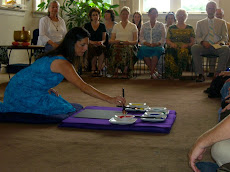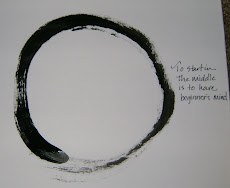May we eat with mindfulness and gratitude so as to be worthy to receive it.
 May we recognize and transform our unwholesome mental formations, especially our greed, and learn to eat with moderation.
May we recognize and transform our unwholesome mental formations, especially our greed, and learn to eat with moderation.May we keep our compassion alive by eating in such a way that we reduce the suffering of living beings, preserve our planet and reverse the process of global warming.
We accept this food so that we may nurture our brotherhood and sisterhood, strengthen our sangha and nourish our ideal of serving all beings.
~ Eating Meditation, Deerpark Monastery
This morning I made a bowl of oatmeal. I added banana and apple slices, a few almonds and walnuts as well as a few dried cranberries. I lit some candles, took out a cloth napkin, and read aloud the Eating Meditation above. Slowly and deliberately I ate my breakfast in silence.
I tasted the sweetness of the oatmeal and banana. My teeth and tongue felt the softness of the banana and cereal, as well as the crunchiness of the apple, the nuttiness of the walnuts and almonds, and the chewiness of the cranberries.
It took me twenty minutes to eat the whole bowl. Nothing to do. Nowhere to go. Except to be be present and mindful of my meal.
Breakfast was delicious and filling.
I attempted to eat at least one mindful meal a week when I returned from Deerpark Monastery this summer. However, I slacked off after two weeks and have only eaten mindfully maybe two or three times since. It was nice to take the time and engage in a mindful meal this morning.
I started thinking about how any mindful practice automatically seems to induce me to be more mindful in all areas. Following breakfast, I removed a big load of laundry from the dryer. I have been listening to Jack Kornfield's book After the Ecstasy, the Laundry on CD in my car (thanks to my friend, Joan, for passing that along to me). Having just returned from a trip to California which included the opportunity to hear HH the Dalai Lama, enjoy time with some of my oldest and dearest friends, as well as time off work, I would say it was a fairly "ecstatic" trip. Easy to be present, easy to tap into all that is good. At home, life resumes in regularity. Ordinariness.
As I folded my warm, clean clothes this morning, I realized how much I enjoy this simple, ordinary, "regular" chore....well, I enjoy it when I have time and choose not to think about it as a "chore."
As I folded my clothes, I thought about how nice it was to fold them, to take care of these things that are important to my daily life. How grateful I am to have clothes of my choosing, that I can afford, and that I have a washer and dryer in my home to help me keep them clean. I noticed the different patterns in my socks and my underwear (and thought what a funny breed we are to make such "necessities" such fun), I felt the contrast in the differing materials - jeans, T-shirts, bras.
The extraordinary in the ordinary. The beauty in the mundane.
And then my thoughts turned to my students.
Parent-Teacher Conferences begin tomorrow. Every student is different. Each have different needs, motivations, ideas, ways of learning and taking in information. Each come from different families, backgrounds, ways of looking at the world. So do their parents.
Sometimes I forget how extraordinary each of these people are. It's not that I don't see my students as individuals (or their parents), it's just that sometimes I get wrapped up in my needs and my ideas in the course of the day: Am I providing the best information? The right information? Am I teaching the class well? If so-and-so isn't paying attention, what happens to the class as a whole? Not that these are "bad" thoughts to have, it's just that I sometimes forget that each and every student has their own agenda, their own needs, their own own-ness (I am not sure what "own-ness" actually is, but I can't think of a better word right now).
Each student is an extraordinary being. So are each student's parents. In the course of an ordinary day, if I am not paying attention, I can miss that truth.
May I be present for each of my students and their parents. May I listen to each of them deeply. May I speak with only right speech; with attention, care, and compassion. May I share only that which is necessary, helpful, kind, and truthful.
May I stop and TRULY smell the oatmeal!





